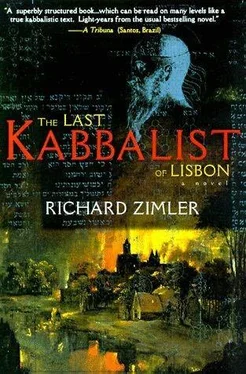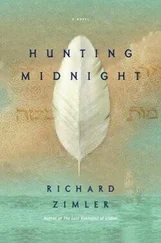Richard Zimler - The Last Kabbalist of Lisbon
Здесь есть возможность читать онлайн «Richard Zimler - The Last Kabbalist of Lisbon» весь текст электронной книги совершенно бесплатно (целиком полную версию без сокращений). В некоторых случаях можно слушать аудио, скачать через торрент в формате fb2 и присутствует краткое содержание. Год выпуска: 1998, Издательство: Arcadia Books, Жанр: roman, Исторический детектив, Философия, на английском языке. Описание произведения, (предисловие) а так же отзывы посетителей доступны на портале библиотеки ЛибКат.
- Название:The Last Kabbalist of Lisbon
- Автор:
- Издательство:Arcadia Books
- Жанр:
- Год:1998
- ISBN:нет данных
- Рейтинг книги:5 / 5. Голосов: 1
-
Избранное:Добавить в избранное
- Отзывы:
-
Ваша оценка:
- 100
- 1
- 2
- 3
- 4
- 5
The Last Kabbalist of Lisbon: краткое содержание, описание и аннотация
Предлагаем к чтению аннотацию, описание, краткое содержание или предисловие (зависит от того, что написал сам автор книги «The Last Kabbalist of Lisbon»). Если вы не нашли необходимую информацию о книге — напишите в комментариях, мы постараемся отыскать её.
The Last Kabbalist of Lisbon — читать онлайн бесплатно полную книгу (весь текст) целиком
Ниже представлен текст книги, разбитый по страницам. Система сохранения места последней прочитанной страницы, позволяет с удобством читать онлайн бесплатно книгу «The Last Kabbalist of Lisbon», без необходимости каждый раз заново искать на чём Вы остановились. Поставьте закладку, и сможете в любой момент перейти на страницу, на которой закончили чтение.
Интервал:
Закладка:
Roseta remained behind with Reza; she was pregnant with her first child—Reza, not Roseta, that is—and moved with her husband and Aviboa up to a farm near Belmonte in the mountains in northeast Portugal. I haven’t seen them since the dock at Belem. They have three surviving sons, Mordecai, Judah and Berekiah, and a daughter, Mira. Aviboa is married to a farmer of chestnuts and wine. She lives nearby, has two surviving children. She never did grow a thumbnail or receive news of her parents.
We pray that the fire of the Inquisition will pass over their valley when it spreads into Portugal from Castile. I fear that it is now only a matter of months. So little time for peace we have in this world.
Judah. When I could get his trousers and shirts away from my mother, I buried them on the Almond Farm, by Uncle’s grave. We said a kaddish to ensure that his soul was set free from the Lower Realms.
Twenty-four years have passed since his disappearance and yet, he’s still just a whisper away. Only three years ago, I believed I recognized his moonstone eyes in a man in Portuguese merchant’s garb sunning his face in the garden below the southeast minaret of the Hagia Sophia mosque. My heart boomed as if shot from a cannon. Dizziness swayed me. I thought: It’s all a mistake. He’s alive , been raised by Old Christians. And he ’ llexplain now wherehe ’ s been. I crept to him and said, “Is it you, Judah?” At his confusion, I took his arm. “Don’t you recognize me? It’s Berekiah. Your brother!”
He patted me on the back as if I were a drunken old fool. “Better get home to your wife before she comes looking for you,” he advised. He laughed at me.
Such is what the younger generation make of sorrow.
Samir, Farid’s father, was never heard from again.
I remember Rabbi Verga telling me in our courtyard that we must remember the dead and how they lost their lives. His words make me smile; are there really persons who can forget?
It turns out that Samson Tijolo, who crossed out all of the names of God in his Old Testament, was right about Jews not being able to speak a future tense in Portugal. Had Uncle lived, could he have done anything about that? There are certain powers which great kabbalists have, and perhaps if he had concentrated…
Or is that all a lie? So much of my faith flowed away with my master’s blood.
Rana, Samson’s wife and my old neighborhood friend, still lives on her farm outside Lisbon. Miguel, her son, apprenticed to a silversmith. Late at night, behind locked shutters, he makes Torah pointers and other holy objects, I’m told.
Our neighbor, Senhora Faiam, died in fifteen-twelve. Gemila and her family are living in their old house as secret Jews. Their dog, Belo, died without ever finding the bone for his missing leg, of course. Some vestiges of life can never be recovered. Although that doesn’t stop us from searching.
I think often of the lemon tree growing above Senhora Rosamonte’s hand. So nice it would be to be tossed some of her fruit.
How does Uncle’s almond tree grow? His death still carves deep furrows inside me in the early morning, when the dew sits on my forehead and my resistance is lowered. Lately, I’ve realized that I’m like a tree whose main limbs were cut with a shohet’s knife. From the scars, I succeeded in branching out as best I could. I flowered even. Many times. But the tree is just not the same as it would have been. How much more upright I would have grown had he…
Forty-four years have watched me pass. I am an old man, with children of my own. Yet how dearly I would love to be fixed in Uncle’s emerald eyes, to feel the protective wing of his white robe unfurl around me. To kiss his lips. Never will it be. Not even were I to chant the Zohar every night for an entire year.
Murça Benjamin persevered after her wish to fulfill the obligation of Levirite marriage was refused. She married a wealthy New Christian barrel maker from Porto—a good man, she wrote to me—and works as a translator for merchants in São João da Foz.
Manuel Monchique, whose wife, Teresa, died alongside Uncle, emigrated to Amsterdam and is one of the directors of a banking institution there. I hear that he has developed an interest in sea voyages and has even traveled to Brazil, where he has made lovely sketches of the native butterflies. He no longer lugs around a sword.
So maybe one can find one’s way home in another country.
Before we left Lisbon, my mother was kind enough to sew a new aba for Attar, the man who lent me his clothing as I fled through the Moorish Quarter on that fateful Sunday of Jewish death. He welcomed me with a hug. Before I left his home, I’d eaten an entire chicken bathed in prunes and lemon. We locked hands to pray in silence, then recited suras from the Koran together.
Isaac Ibn Farraj, the ascetic who rescued his friend’s head from the pyre in the Rossio, ended up in Valona and is a successful scribe. I met him by accident once in Rhodes after it was taken by the Turks, and he looked as if he hadn’t eaten a thing since he’d left Lisbon. Goat ribbed, he was. With a beard like a white fungus. Apparently he’d learned a thing or two about the new fruits arriving from the New World, because he kept repeating to me, “Beware of tomatoes!”
Dom Miguel Ribeiro, the nobleman who learned of his Jewish origins from Uncle, still lives in Lisbon as a secret Jew. He lost an eye in a hunting accident shortly after we left. I suppose that he simply could not give up one last Old Christian vice.
Oh, a curious thing happened to Didi Molcho. He rose through the ranks of the Portuguese court system to become a royal secretary. Then, as he recounts it, there appeared before King João, King Manuel’s heir, a swarthy little Jew with glowing eyes akin to my uncle’s claiming to be a representative from the lost tribe of Reuben in the desert wilds of Arabia. His called himself David Reubini, and he came to Portugal hoping to gain troops for a plan to win back Jerusalem from the Turks. Although King João soured of him, Didi was captivated. He embraced Judaism once again and circumcised himself. His study of the kabbalah brought on visions ending in prophecy.
Using his Jewish name of Solomon, Didi journeyed to Italy to preach, and the accuracy of his predictions earned him fame amongst Christians and Jews alike. In May of fifteen twenty-nine, after exchanging correspondence, I received him in my home in Constantinople and, over the next six months, helped him learn Abulafia’s techniques for untying the knots of mind. His book of sermons, based partly on our studies together, was published in Salonika that same year. He’s back in Rome now, following his visions, and has even gained Pope Clement’s favor. I fear for his life, however. Popes are envious of men with true faith and as devious as famished ferrets. And Didi, God bless him, has had his earthly vision clouded by higher landscapes.
Farid lives just down the street from us, has had his poetry published with success here in Constantinople. His lover of seventeen years is a blacksmith named Shamsi who plays the oud and sings with the voice of a rustic flute. He’s an outgoing, humorous man with lean muscles and eyelashes like black rose petals. Not gifted with the dimensions of a Basque, of course, but he seems to keep Farid satisfied. Years ago, they adopted two orphan boys, Samir and Rumi. They were always good, if somewhat rough, playmates for my girl, Zuleikha, and boy, Ari.
We all eat together every night. It is a great comfort to me to be able to converse with Farid with my hands. Sometimes, when memory assaults me and I haven’t the will to hear my words…
When we were last in Lisbon together, all those years ago, I asked Farid, ‘Will God be waiting for us in Constantinople, you think? He’s disappeared without a trace from Lisbon.”
Читать дальшеИнтервал:
Закладка:
Похожие книги на «The Last Kabbalist of Lisbon»
Представляем Вашему вниманию похожие книги на «The Last Kabbalist of Lisbon» списком для выбора. Мы отобрали схожую по названию и смыслу литературу в надежде предоставить читателям больше вариантов отыскать новые, интересные, ещё непрочитанные произведения.
Обсуждение, отзывы о книге «The Last Kabbalist of Lisbon» и просто собственные мнения читателей. Оставьте ваши комментарии, напишите, что Вы думаете о произведении, его смысле или главных героях. Укажите что конкретно понравилось, а что нет, и почему Вы так считаете.












